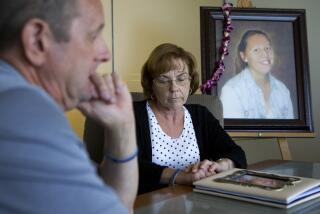Antonio Is Dead; Has Police Department Credibility Died Too?
- Share via
Police have work to do in a little Huntington Beach neighborhood that otherwise seemed to be a safe and serene place late Tuesday morning.
Children frolicked outdoors at nearby Oak View Elementary School. Next door, instructors held English classes for adults at the community center. The streets in the neighborhood were quiet and largely deserted, except for the isolated street vendor, yard worker or woman walking with young children. The prevailing sound was silence, save for the occasional Spanish-language songs wafting from inside people’s homes.
All is not well, however, in this heavily Latino enclave just out of sight from Beach Boulevard and the commerce of the city.
This is a neighborhood where early Saturday morning a police officer shot to death an 18-year-old man who lived there.
And it goes to the heart of what is wrong here that, from that point on, suspicion dominated the efforts of figuring out what happened.
Friends and relatives of the dead man, Antonio Saldivar, immediately questioned the police version of the shooting, in which a uniformed officer thought Saldivar was acting suspiciously by peering into a pickup truck. The officer chased him on foot and confronted him not far away, kneeling behind a car. When the young man rose, police say, he was holding what appeared to be a weapon, prompting the officer to shoot.
Police confirmed later that Saldivar was unarmed. What he was holding, they said, was a toy rifle apparently picked up in the yard where he was shot. The owner of the house confirmed the rifle had been left outside overnight. He also told the media and police that he came to his front door moments after the shooting and saw Saldivar still alive and lying close enough to the rifle to push it away, as police had commanded.
If Saldivar was holding a toy rifle, it would be impossible to question credibly the officer’s decision to shoot. In the darkness (about 1:30 a.m.) and confronting a fleeing suspect, any cop could be justified in shooting.
Saldivar’s family and friends question whether Saldivar actually pointed the toy rifle at police. They have no way of knowing if he did, but the ongoing legacy of police misconduct in Southern California and elsewhere demands that police answer every question put to them.
It’s fair to ask why an unarmed man who hadn’t committed a crime (police didn’t see him take anything from the truck) wound up dead. It’s logical to ask why anyone, unless he had a death wish, would pick up a toy rifle and point it at a cop.
But that doesn’t mean the police version is phony. Their comeback might be that Saldivar didn’t know immediately the rifle was a toy and, in the darkness and with adrenaline pumping, picked it up.
That makes little sense, but who can say?
What we’re left with are two tragedies. One is the death of an unarmed man who knew--even if police didn’t--that he posed no threat to the cop.
The other tragedy is the climate of mistrust that reflexively causes people to question the police version.
What seems inexplicable to many of us--fleeing if you’ve done no wrong--is understandable to people whose experience with police isn’t so grand.
“We don’t trust the police, because if they see us, brown people on Beach Boulevard, they’re going to stop Mexicans,” says 20-year-old David Gonzalez as we talk on the street where Saldivar lived. “They hassle you for no reason, just for being Mexican, Latino, whatever. They used to tell us police were our friend. We don’t believe that.”
Gonzalez says police have a reputation in the neighborhood for roughing up people they stop. If that’s your mind-set, outrunning a cop might pay off.
“He probably panicked,” Gonzalez says of Saldivar, whom he had known for a few years. “What else could it be? He was a good guy.”
Gonzalez’s scenario either makes sense or is a convenient cop-out. If he reflects a meaningful share of his neighbors’ feelings, it bodes poorly for confidence in any investigation.
If so, it is yet another insidious effect of the poisoned relationship we often see between police and some in America’s ethnic-minority neighborhoods.
“We don’t trust the cops, because they see us like we’re nothing,” Gonzalez says. “Cops hate [Latinos]. I don’t know. It’s racism.”
With Saldivar dead and a toy rifle lying near him, it’s hard to picture this investigation going much further than that.
But if Huntington Beach police really want to complete the job in this case, they’ll head out to the neighborhood and start all over again to ask why people don’t believe them.
Dana Parsons’ column appears Wednesdays, Fridays and Sundays. Readers may reach Parsons by calling (714) 966-7821 or by writing to him at The Times’ Orange County edition, 1375 Sunflower Ave., Costa Mesa, CA 92626-1697, or by e-mail to dana.parsons@latimes.com.
More to Read
Sign up for Essential California
The most important California stories and recommendations in your inbox every morning.
You may occasionally receive promotional content from the Los Angeles Times.










